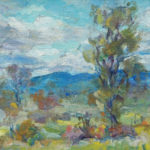OH, DAD, IF IT’S NOT ABOUT SHIPWRECKS, crop failures, war or some social injustice, you’re just not interested.”
That may sound harsh, but it’s just my kids going on again about my allegedly narrow musical horizons. No offence taken.
They say it’s musical tunnel vision. Fine. I plead guilty. Jazz? I don’t get it. I’ve tried – especially since one lad is all about Miles Davis, John Coltrane, WyntonMarsalis et al. Sorry. Still don’t get it. And Sarah Brightman is about as operatic as I can handle. That’s sure to get a snicker from the Le Nozze di Figaro crowd.
But I’m a product of my environment and my musical proclivities were formed in the many folk clubs that popped up in the area surrounding the University of Toronto’s downtown campus in the late 50s and early 60s. Those were the pre-flowerchild and pre-the-gentrification-of-Yorkville days when entertainment was affordable even for impecunious university students. We were regulars at one or another of those smoky little holes-in-the-wall where the young, mostly obscure folkies sang their soulful tunes.
No Yuppie playground then, Yorkville was just a collection of modest coffee houses domiciled in the Victorian era residences that lined Yorkville Avenue. The Riverboat, the Penny Farthing and the Mynah Bird were but three of many. And not all the artists who played those clubs were doomed to obscurity. Gordon Lightfoot was among several future notables who cut their teeth at the Riverboat. Joni Mitchell got her start at the Penny Farthing. Although, also a music venue, the Mynah Bird was, perhaps, better known for topless dancers and a nude male chef. Good reason not to eat there. No fried bacon on the menu.
Just around the corner on Avenue Road stood the Purple Onion. That’s where Buffy Sainte Marie wrote her controversial anti-war song, “The Universal Soldier”, one evening between sets.
A little further north on Avenue Road, a young duo, Ian and Sylvia, honed their chops at the Village Corner Club.
The music of those modern-day balladeers resonated with me. It still does. Theirs are stories of love, hope, despair, compassion, joy, tragedy and protest with a sense of history and our place on this planet. They tug, enrage, sadden, elate, inspire and educate. Sometimes all of the above simultaneously.
Back in March 1968, long after my Yorkville days, Joy and I took in performances by two iconic folk artists of that decade at Massey Hall.
First up was the late Phil Ochs whose biting social commentary is legendary. In “The Party,” Ochs becomes a fly on the wall observing, with acerbic wit, the interaction of the diverse and mostly derisible characters at a large social gathering.
The one line that has stuck with me from the very first is, “The wallflower is waiting, she hides behind composure / She’d love to dance and prays that no one asks her.” I feel her pain every time I hear it.
In “Here’s to the State of Mississippi,” Ochs rips into the entire fabric of a state that makes most lists of the most backward states in the Union. No one escapes. Not the schools, not the police, the judges or the government – not even the churches. And the refrain, “Mississippi find yourself another country to be part of,” could have renewed relevance today.
Later that same week, we saw the great Joan Baez who is probably best known for her rendition of “We Shall Overcome,” a song that became emblematic of the civil rights movement and the anthem of the 1963 March on Washington. And I can thank Ms. Baez for a lesson well learned. In those days, I taught English in a tough Toronto high school. One of my classes consisted entirely of about twenty low-achieving, disinterested 15 and 16-year-old boys. The prospect of teaching poetry to that group from the prescribed anthology seemed so hopeless that I ditched the textbook in favour of some of my favourite folk LPs. Rationale? Folk music is poetry. Right?
I was surprised at how attentive they were to the first few tracks from my favourite Baez album. Then, when I attempted to squeeze some verbal response out of them, one lad, maybe the toughest of the lot and one whom I had the least hope of reaching, offered this, “I think she’s beautiful.” I blinked. When pressed to elaborate, he added, “I think she has a beautiful mind.”
That was the day I learned to never judge a book by its cover.
Back to the evening of the Baez concert. Afterwards, Joy and I retired to my favourite university days pub, Lundy’s Lane, in the now sadly demolished Babloor Hotel (yes, dear editor, that’s how they spelled it). Anyway, after a stiff libation, I worked up the nerve to pop the question that had been percolating in my mind for months. Although, she claims not to remember, Joy’s response is as clear to me today as if it happened yesterday. “I think you know the answer,” she said. That was it. I don’t think she ever actually said, “Yes.” But we celebrated our 50th last summer. Too late to back out now, dear.
Story by:
George Smith




